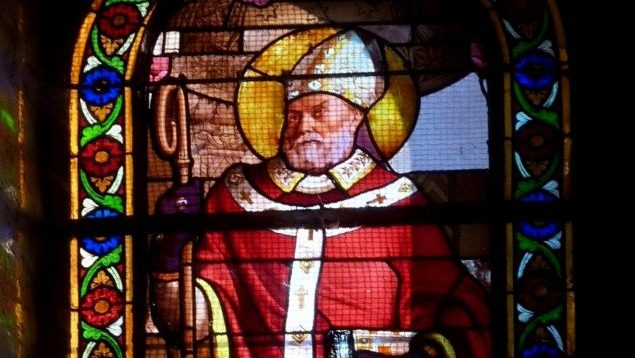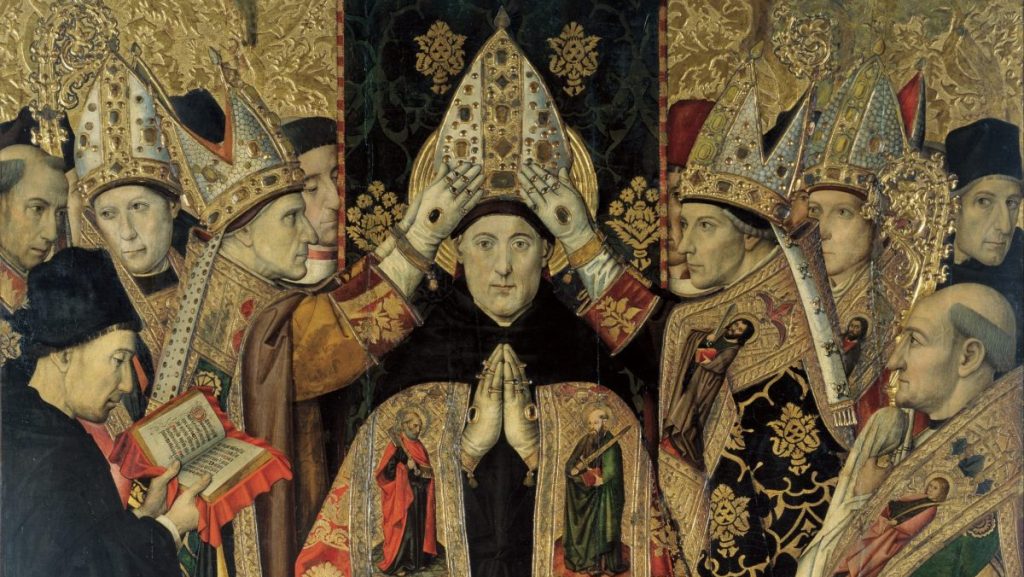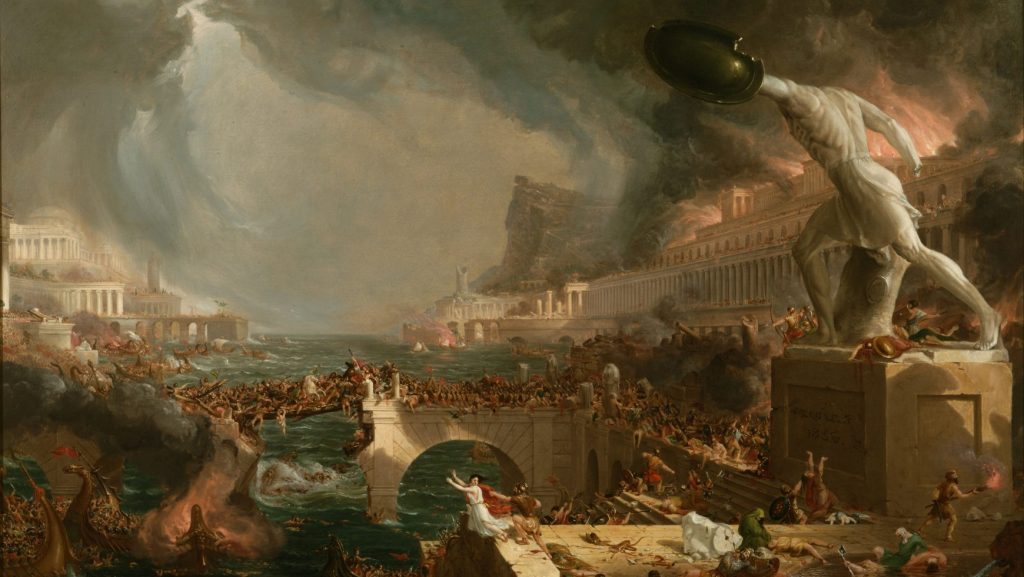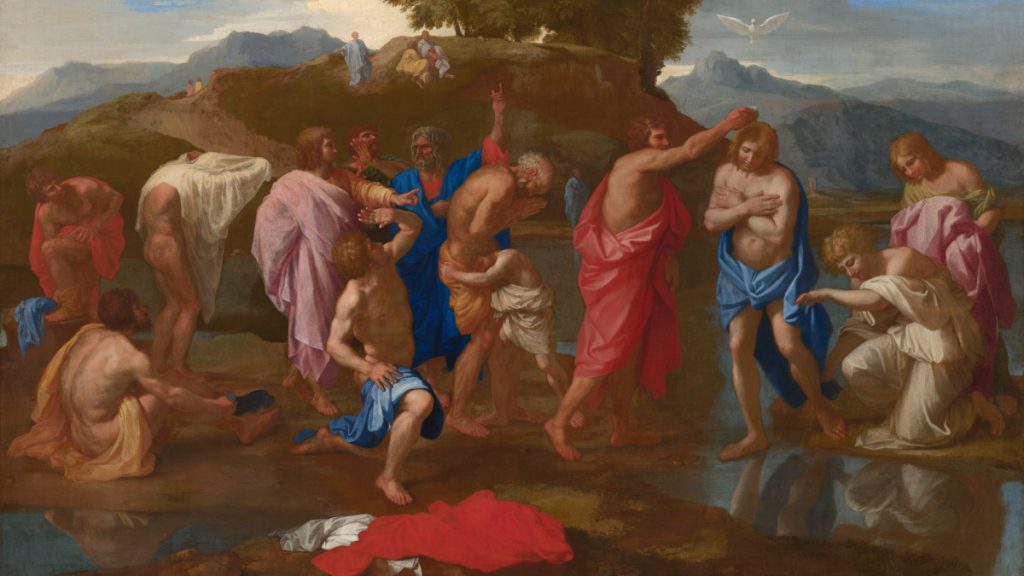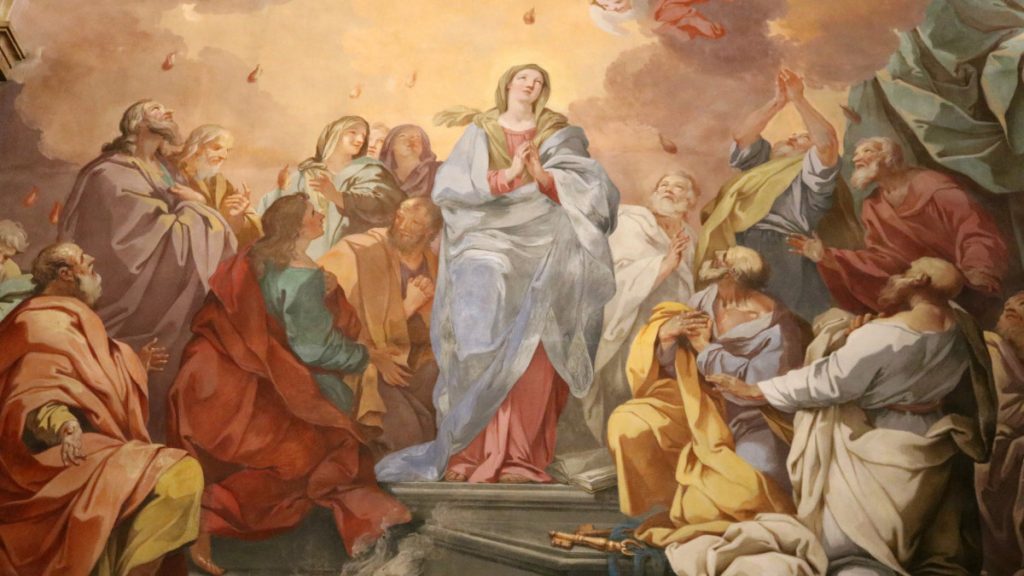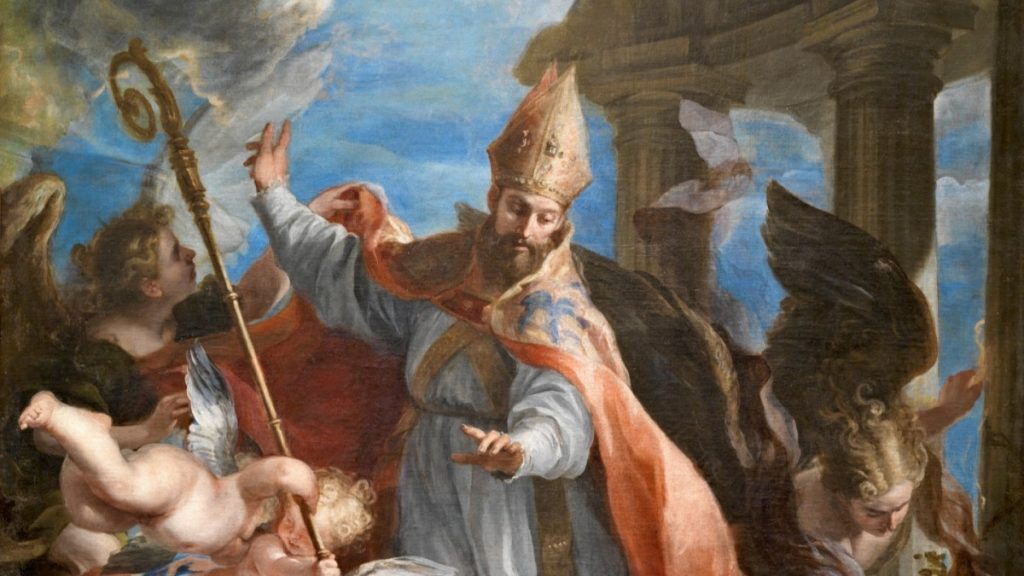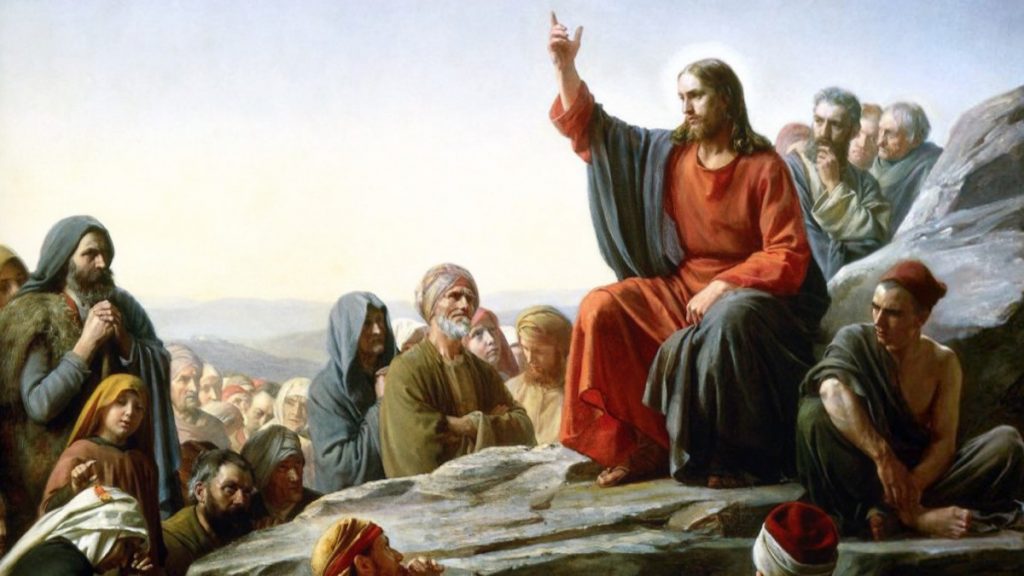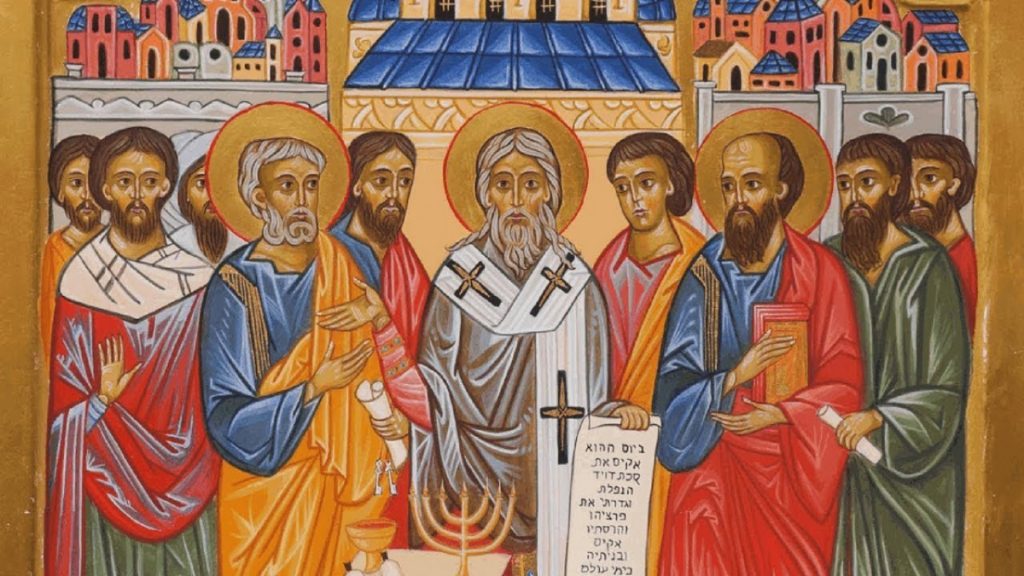(Updated July 10, 2025)
This Author Quote Archive collects pertinent quotes from the Church Father, St. Faustus of Riez.
Next to each quote are the Topic Quote Archives in which they are included.
This Quote Archive is being continuously updated as research continues. Quotes marked with “***” have not yet been organized into their respective Topic Quote Archives.
Homilies
St. Faustus of Riez, A Homily on the Body and Blood of Christ1
(§§1-12)
(§1) The greatness of heavenly blessings transcends the limits of the human mind. Accordingly, divine providence has so ordained that devout faith can grasp what our reason, weighed down with material cares, cannot grasp, and that a healthy faith supports the intellect. Since, on account of Adam’s sin, we are liable to birth and death, God looks down from on high on the magnitude of our transgressions and shapes the gift of redemption to conform with the nature of our captivity. He did this so that He might offer death to which He was not subject for the death which was our due, for we had no more the resources of life than had He the limitation of death. He assumed, therefore, our mortal nature, so that life joined to immortality might die for the dead. And since the body he assumed was to be taken away from our sight and returned to the stars, it was necessary that he should consecrate for us on this day the sacrament of his body and blood so that it might be legitimately worshiped continuously in this sacrament which he had offered once for our redemption. Since the redemption was in continuous and tireless motion for the redemption of men, the offering of the redemption should likewise be perpetual and the perennial victim be abiding in memory and be always present in our hearts.
This is the true, unique, and perfect host which we must judge by faith, not by appearances, by interior sentiment rather than by the external senses. It is this which the divine authority guarantees to us: “My flesh is food indeed, and my blood is drink indeed” (John 6:56). 233 | 234
(§2) Away, then, with all equivocation of the infidels, since the author of the gift is also the one who guarantees its truth. For a visible priest in virtue of a secret power converts by his own words visible elements into his body and blood, saying: “Take and eat: this is my body,” and continuing the consecration: “Drink of this: this is my blood” (Matt. 26:26, 28). Accordingly, just as at the Lord’s behest the lofty heavens, the depths of the sea, and the expanses of the earth were suddenly created from nothing, so by the same divine omnipotence in the spiritual words of the sacrament his power is revealed and reality obeys it.
Ask yourself, then, you who have been regenerated in Christ, how great and how celebrated are the achievements of the divine blessing, and do not judge it extraordinary or impossible that what is earthly and mortal should be changed into the very substance of Christ.
(§3) Long estranged from life and a stranger to divine mercy and the way of salvation, you were nothing but an exile because of the death in your soul. But suddenly introduced to the laws of God and renewed by the mysteries of salvation you passed, not visibly, but by faith, into the body of the Church.
By a hidden purification you deserved to be transformed from a son of perdition into an adopted son of God. Retaining all your physical dimensions you have visibly become greater than your former self without any quantitative increase, and while retaining your original personality you have become a very different person by the workings of faith. Nothing has been added to your stature externally, but you have undergone a complete interior transformation, as man has become the son of Christ and Christ has taken form in the soul of man. Just as without bodily perception you have been rid of your baseness and invested with a new dignity, just as Christ has healed your wounds, cleansed your stains, and washed your uncleanness, without any help from your eyes or your senses, so when you approach the holy altar to be nourished by the food from heaven, contemplate, adore, and marvel at the sacred body and blood of your God, grasp it with your mind, take it to heart, and above all absorb it in your interior being. 234 | 235
(§4) But if the manna of the Old Law of which we read, “He rained manna upon them for food and gave them heavenly bread” (Ps. 78:24), gave to the taste of each one who took it the pleasure which he desired, being one thing when taken and another when received, for its taste was formed invisibly on the senses of each recipient, if then this manna came down from heaven and surpassed its natural properties and specific appearances in the variety of its tastes, if the dispensation of the giver endowed his creature with such diversity that taste provided what was lacking to sight, because the novelty and worth of this food depended on the desire of the recipient and the heavenly gift refreshed each one with a variety of tastes by the bounty of him who rained down this bread upon them: since this is so, let faith accomplish now what hunger did then for bodily taste, as we read, “A man shall approach and the heart is deep and God shall be exalted” (Ps. 64:6). And so what delight was caused in that instance to the taste is achieved in the present instance by the Blessing in the senses. Let the power of the consecration itself help you to understand and perceive the sacrifice of the true body of the Lord, and let him who was then prefigured for you in the manna be manifested to you now in grace.
(§5) That Christ Himself was prefigured by the manna is shown clearly by the words of the Prophet, saying: “He rained down manna upon them for food and gave them the bread of angels” (Ps. 78:24).
And what is the bread of angels except Christ, who fills us with the nourishment of his love and the brightness of His glory? And He gives us this bread, as the Prophet says: “On the sixth day let it be twice as much as they bring in on other days” (Ex. 16:5). While at first the manna was given by the Law from Sunday and was refused only on the sabbath, so it was prescribed that the Church, which had consecrated Sunday, the day of the resurrection, to Christ, should be the place for His reception, and that He should be denied to the synagogue in which the cult of the sabbath persisted. Thus the sabbath day is deprived of the heavenly bread. 235 | 236
Concerning this bread the Old Testament writes: “he that gathered much had nothing over and he that gathered little had no lack” (Ex. 16:18), in that the reception of the Eucharist is not a matter of quantity but of efficacy. For the body of the Lord distributed by the priest is as present in a small particle as in the totality of the species. When the Church of the faithful receives it, the whole is received by the assembly and likewise the whole in individuals. This meaning is derived from the words of the Apostle: “He who had much had nothing over, and he who had little had not less” (2 Cor. 8:15).
This cannot be said of ordinary bread. Place ordinary bread before hungry men and it would not reach individual in its entirety. Each would only receive his portion in pieces and fragments. But when the true bread is received, individuals receive just as much as the whole assembly; one, or two, or any number receives the whole without diminution, because this blessed sacrament can be distributed, but it cannot be exhausted in being distributed.
(§6) We see the form of this sacrifice already described in the texts of the Jews, for we read of Melchizedek in Genesis: “Melchizedek the king brought out bread and wine and blessed Abraham. For he was a priest of the most high God” (Gen. 14:18). And while future circumcision by the prepuce, that is by the pagan, is blessed, the glory of the Church is foretold, and the gentile people acquired from the unfaithful synagogue is preferred. The genealogy or origin of this Melchizedek has revealed the notion of that time; and the offering of bread and wine prefigured the sacrifice of Christ about which the Prophet foretells: “You are a priest forever according to the order of Melchizedek” (Ps. 110:4).
(§7) For Moses also, speaking of this mystery, designates bread, wine, and blood under one denomination; and in the blessing of the Patriarch, he indicates at greater length the announcement of the passion of our Lord, saying, “He washes his garment in wine, 236 | 237 his robe in the blood of grapes” (Gen. 49:11). Notice how clearly the created object, wine, is taken to mean the blood of Christ. And recognize what you should furthermore seek from the twofold species: “Unless you eat,” it says, “the flesh of the son of man, and drink his blood, you shall not have life in you” (John 6:53).
This is a clear and decisive refutation of the Pelagians who, carried away by impiety, dare to say that baptism should be conferred on infants not for this life but for the next one. For under these divine words in which the Gospel says, “You will not have life in you,” must be the clear meaning that every soul which has not received the gift of baptism is deprived not merely of future glory but of the present life.
(§8) That this wine of our Lord’s blood must be mingled with water is clearly shown not merely by tradition but also by very nature of the passion itself. Blood and water flowed from his sacred wise when he was pierced with the lance, as had been foretold by the Prophet long before: “He smote the rock so that water gushes” (Ps. 78:20). And the Apostle: “They drank from the rock which followed them” (1 Cor. 10:4). You see that Christ’s mercy follows the one who drinks Christ’s grace. In Solomon we read it predicted of Christ Himself: “Wisdom has built herself a house” (Prov. 9:1), that is, he assumed a human body in which the fullness of divinity dwells; “she has set up her seven pillars” (Prov. 9:1), because it is filled with the blessing of a sevenfold grace: “she has slaughtered her beasts, she has mixed her wine, she has also set her table” (Prov. 9:2). And in the following: “Come, eat of my bread and drink of the wine I have mixed for you” (Prov. 9:2). That is what we read of the wine mingled with water.
(§9) Let us now seek the reason why the Lord has wished the two elements to be mingled. When at the wedding feast of the Jews the wine, that is to say, faith was lacking [John 2:3] because the fruit of the vineyard failed, concerning which it is written, 237 | 238 “when I looked for the crop from grapes it brought forth thorns” (Isa. 5:4) (and so a crown of thorns was placed on the Redeemer’s head), when the Lord at the time of the marriage, that is when the spouse joined Himself to His Church in the joy of Easter, He turned water into wine, plainly prefiguring the multitude of races that would come from the grace of His blood. That the waters signify peoples is clear from the sacred text as we read, “The waters that you saw…are the peoples and nations and tongues” (Apoc. 17:15). And so we notice that peoples are prefigured in the word “waters” and that the blood of our Lord’s passion is indicated in the wine. And so, when water and wine are mingled in the sacraments, the faithful are incorporated and joined with Christ, and united with him by a bond of perfect charity so that we can say with the Apostle, “Who shall separate us from the love of Christ? Shall tribulation, or distress, or persecutions?” (Rom. 8:35), and so forth.
(§10) Further, we should see an evident sign of the unity of God’s people in the very fact that we know that the bread is composed of numerous grains of wheat. Just as the grain which is perfected to its white color only by the care of the thresher, and the single substance of bread is got by mixing water in the dough and baking it, so the various races and diverse nations assembled in one faith become the one body of Christ, and the Christian people emerge, like countless grains of wheat, winnowed and sifted from the infidel nations by faith. Then it is assembled in unity, separated from the cockle of infidels, and, instructed by the teaching of the two Testaments, as the wheat is subjected to the twin operation of the millstones, it emerges gleaming, and is transformed into its original state of pristine splendor, and by the water of baptism and the fire of the Holy Spirit is is baked to form the body of that eternal bread.
(§11) Just, then, as the grains cannot be separated from the combination of the one piece of bread, and just was waters mingled with wine cannot return to their former state, so the wise faithful who know that they have been redeemed by the blood and passion of Christ ought to be like members inseparable from their head, so united by their docile faith and ardent piety that they cannot be separated from Him voluntarily or even under compulsion 238 | 239 by any earthly ambition, and that they remain inseparable even in death.
And let no one doubt that mere creatures can, at God’s omnipotent behest, pass into the nature of the body of the Lord when He sees man himself become the body of Christ through the workings of divine mercy.
(§12) Just as a convert to the Christian faith is still in the bondage of the old debt before the words of baptism, but once these have been pronounced he is stripped of all the dross of sin, so when created things are placed on the holy altars to be blessed by heavenly words before they are consecrated by the invocation of His name, they merely contain the substance of bread and wine but are changed into the body and blood of Christ after the words are pronounced.
What wonder is it if He who by a word can create can also convert created objects by a mere word? Indeed it seems to be a lesser miracle to change for the better an already created object. What, pray, can be difficult to Him who could without difficulty form man from the slime of the earth, who could clothe him in His own divine image, easily recall him from hell, restore him from perdition, raise him from the dust, elevate him from earth to heaven, make him into an angel, endow his human body with His own radiance, sublimate his shadow to share in His kingdom. Thus He who assumed our human body in all its frailty would assume us and invest us with His own immortality. For which glorious resurrection may He deign to prepare us by works of piety, who lives and reigns forever and ever. Amen.
